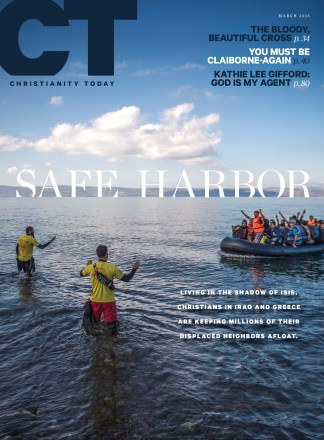After six years living in the Sandtown-Winchester neighborhood of West Baltimore, my family and I have moved to South Sudan. My three-year-old daughter keeps asking, “Why did we move?”
“To help the mommies and babies at the hospital,” I say.
She usually replies, “Can I help take care of the mommies and babies, Daddy?”
My daughter doesn’t recognize yet how dangerous childbirth can be without access to safe medical care. She also doesn’t know our old neighborhood in Baltimore was one of the most violent in the city. But she does understand that there’s sorrow in moving across the world—and joy in working together to help people.
We felt called to South Sudan because the hospital here, Bet Eman, is strengthening the health system while working with the local church to proclaim a hope that medicine can’t give. The church helped start the hospital because it recognized how important safe childbirth is to bodies and souls. It’s the same reason, fundamentally, that we were drawn to Sandtown: because of a church committed to holistic ministry.
Holistic is a hot word in many fields these days. In health care, doctors and researchers have realized that prescription drugs and hospitalizations do little to fix the most troublesome health problems. But too often, “holistic medicine” means alternative treatments like acupuncture instead of rethinking health care based on spiritual and physical needs.
Holistic ministry, too, can become just a grab bag of services, not a rethinking of the very nature of ministry. Our church in Baltimore, New Song Community, practices what they preach, though—and they do preach. We loved being part of a racially and economically diverse congregation that proclaimed gospel truth in sermon and song every Sunday.
Wholeness is inseparable from healing—and holiness. As Wendell Berry writes in his essay “Health Is Membership,” “To be healthy is literally to be whole; to heal is to make whole.” Christians in community development settings like New Song and Bet Eman practice this better than anyone I know, because they walk alongside people in need. They see that the maladies of poverty don’t just come from a lack of material things like money, medications, or schoolbooks. Our ideas, beliefs, and physical environment also intimately affect our health. Healing one area requires healing every area—and it can’t be done without access to the spiritual truth that sets us free.
So while public health is, properly, the responsibility of whole communities, the church has a role to play that no other institution can. Governments can restore or maintain wholeness just by building safer roads to the hospital or making sure children don’t live in homes with lead paint. However, personal vices and distrustful communities frustrate even the best policies—just as bad policy strangles good character and sows distrust. Without the church, who will hold policymakers accountable while also preaching, teaching, and discipling to instill virtuous habits that policy can at best only nudge? Health departments and local researchers often document the needs of communities with great accuracy. But in many settings, only the church can and should mobilize material and spiritual resources to actually meet those needs.
This is the thread that connects urban Baltimore to rural South Sudan. I felt called overseas long before God put Baltimore on my heart. I didn’t expect to fall in love with the city like I did. But living in Sandtown during medical training was clearly part of God’s plan for my family. The way we will preach, teach, and heal in South Sudan has been profoundly shaped by the time we spent there.
Sandtown’s greatest need is not good doctors but good neighbors. South Sudan, though, desperately needs good doctors. So even as we feel the weight of sacrifice and the sorrow of parting, the community we’ve loved for six years has supported us and sent us out because they want to be a part of this beautiful work. Even if they can’t send money, we are still taking everything else they’ve given us. This is what holistic ministry ultimately means: “helpers” like me and the people I came to help share in the joy of mutual transformation. Our neighbors in Sandtown have shaped the way we love. And that love, in turn, will shape the wholeness we hope to bring to mommies and babies in South Sudan.
Matthew Loftus teaches health workers and practices family medicine in South Sudan with his family (MatthewandMaggie.org).










